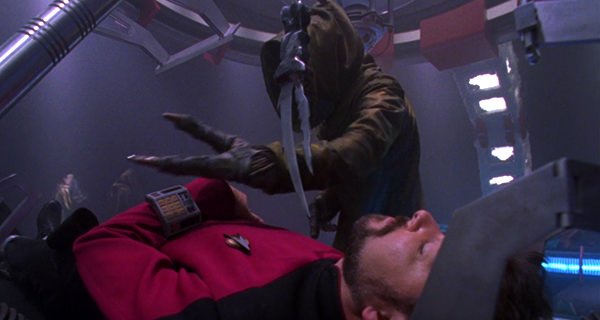TO BOLDLY REVIEW #11 – STAR TREK: NEXT GENERATION (1992 – 1993) – SEASON 6
Based on Star Trek & Created by: Gene Roddenberry
Season 6 writers (selected): Joe Menosky, Jeri Taylor, Frank Abatemarco, Ronald D. Moore, Jean Louise Matthias, Ronald Wilkerson, Brannon Braga, René Echevarria, Ward Botsford, Diana Dru Botsford, Michael Piller, Allison Hock, Robert Hewitt Wolfe, Naren Shankar, Ronald D. Moore, Morgan Grendel, Ronald Wilkerson, Jean Louise Matthias, James E. Brooks, Michael A. Medlock, etc.
Season 6 directors (selected): Les Landau, Cliff Bole, Winrich Kolbe, Alexander Singer, Robert Weimer, Robert Scheerer, Adam Nimoy, Patrick Stewart, Jonathan Frakes, Gabrielle Beaumont, Dan Curry, James L. Conway, LeVar Burton, etc.
Main Cast: Patrick Stewart, Jonathan Frakes, LeVar Burton, Whoopi Goldberg, Colm Meaney, Michael Dorn, Marina Sirtis, Brent Spiner, Gates McFadden, Michelle Forbes, Majel Barrett, Rosalind Chao, plus guests: David Warner, Olivia D’Abo, John De Lancie, Daniel Davis, Norman Lloyd, Rene Jones, Stephen Hawking, James Doohan, etc.
Music/Composers: Alexander Courage, Jerry Goldsmith, Dennis McCarthy, Ron Jones, Jay Chattaway
Production Company(s): Paramount Television, CBS Television
**** CONTAINS SPOILERS ****
I watch a lot of television drama and comedy shows, as well as films, so I can be quite the critic and hard to please. Too many though to find the time to review every single one on this website. However, over the past couple of years I have ventured into the project of chronologically watching every episode of Star Trek in release order, then reviewing each season. I have now completed the viewing of season six of STAR TREK: THE NEXT GENERATION and can safely say that the quality of the writing, acting, directing and production values remained exceptionally high. Season 6 felt just as fresh watching it now and, while set in the future, it did not feel dated in any way.
One always worries about having fatigue for a particular show that continues for many seasons. Moreover, many television programmes can quickly run out of ideas and “jump the shark” by resorting to desperate concepts, parody or relying on special guest appearances to bolster weak writing. While Star Trek has always represented a robust set of values, ideals and structure, it would be easy for the science fiction to be over-blown and concepts become more bizarre. While some of the episodes in season 6 stretched credulity, on the whole it was another twenty-raft of consistently superb works of television. Indeed, a major strength of this particular episodic show remains the characters. Each of the ensemble gets several opportunities to shine and here I present a mere six of my favourite episodes of season 6. It could easily have been double that!
RELICS – EPISODE 4
Talking of characters, the episode Relics contrived in a highly positive way to bring back Montgomery Scott (James Doohan). Having escaped being trapped in a transporter buffer for some decades, Scottie clashes initially with Geordi (LeVar Burton), before the two inevitably join forces to save the Enterprise. A great episode which conflicts Scott’s experience with La Forge’s youthful exhuberance, highlighting that old age is no barrier to resolving major engineering and life problems.

SCHISMS – EPISODE 5
Given the number of physical wars with the well-known foes such as the Klingons and Romulans, this creepy episode did something different with an insidious and hidden alien enemy. The superb script finds Riker, Worf, Troi and Data discombobulated, and sleep deprived as their behaviour on the Enterprise is confused to say the least. When other crew members go missing they begin to piece together the events on the Holodeck, with Schisms overall using suspense and horror to excellent effect.

CHAIN OF COMMAND – PARTS 1 & II – EPISODES 10/11
A fantastic two-parter finds Captain Picard being sent on a covert mission into Cardassian territory. Not only do the episodes introduce an espionage mission, but they also provides excellent character conflict on the Enterprise. This is because Captain Jellicoe, portrayed by the formidable character actor Ronny Cox, takes over the Enterprise and he has a more aggressive style when compared with Picard. Riker especially finds himself clashing with Jellicoe’s more egregious decisions which exert pressure on the crew. Part two of Chain of Command heightens the tension as Picard is captured by the Cardassians and mercilessly tortured. Here Patrick Stewart gives a powerful and emotional performance as a man sent to the edge of darkness by David Warner’s interrogator. Stewart and Warner in a room attempting to outwit each other makes this episode very special television. How many lights do you see?
FRAME OF MIND – EPISODE 21
Frame of Mind is an incredibly clever episode structured around a stage play within the hallucinatory mental breakdown of Will Riker. Opening with Riker rehearsing Dr Crusher’s play called Frame of Mind, and about to go undercover on a secret mission, he suddenly finds himself falling apart mentally in an insane asylum. Cutting back and forth between the asylum, the play and the Enterprise, Jonathan Frakes excels as Riker. He is usually such a cool character, so to find him experience fragility, confusion, anger and depression is an extremely emotional experience for the audience.

SUSPICIONS – EPISODE 22
I was going to choose the episode Second Chances as that has Will Riker finding, following a transporter accident eight years earlier, that he has a duplicate. However, I am such a sucker for whodunnits and Riker features heavily in my prior selection. Moreover, I also I really enjoyed that Suspicions was led by the character of Dr Beverly Crusher, who turns detective after the death of a Ferengi scientist. Structured like a noir detective film, Crusher recounts to Guinan (Whoopi Goldberg) how she is about to be court martialled and lose her career for defying Starfleet regulations. There’s a great (if mildly obvious) twist as Crusher discovers an unlikely killer, with Gates McFadden giving a committed lead performance. Lastly, the episode also introduces the fascinating scientific theory of metaphasic shielding, a technique which returns in the two-parter Descent.

















